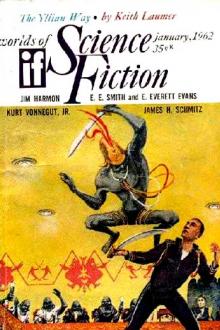Bat Wing by Sax Rohmer (bts books to read .TXT) 📗

- Author: Sax Rohmer
Book online «Bat Wing by Sax Rohmer (bts books to read .TXT) 📗». Author Sax Rohmer
BAT WING By Sax Rohmer
CONTENTS
CHAPTER I. PAUL HARLEY OF CHANCERY LANE
CHAPTER II. THE VOODOO SWAMP
CHAPTER III. THE VAMPIRE BAT
CHAPTER IV. CRAY’S FOLLY
CHAPTER V. VAL BEVERLEY
CHAPTER VI. THE BARRIER
CHAPTER VII. AT THE LAVENDER ARMS
CHAPTER VIII. THE CALL OF M’KOMBO
CHAPTER IX. OBEAH
CHAPTER X. THE NIGHT WALKER
CHAPTER XI. THE SHADOW ON THE BLIND
CHAPTER XII. MORNING MISTS
CHAPTER XIII. AT THE GUEST HOUSE
CHAPTER XIV. YSOLA CAMBER
CHAPTER XV. UNREST
CHAPTER XVI. RED EVE
CHAPTER XVII. NIGHT OF THE FULL MOON
CHAPTER XVIII. INSPECTOR AYLESBURY OF MARKET HILTON
CHAPTER XIX. COMPLICATIONS
CHAPTER XX. A SPANISH CIGARETTE
CHAPTER XXI. THE WING OF A BAT
CHAPTER XXII. COLIN CAMBER’S SECRET
CHAPTER XXIII. INSPECTOR AYLESBURY CROSS-EXAMINES
CHAPTER XXIV. AN OFFICIAL MOVE
CHAPTER XXV. AYLESBURY’S THEORY
CHAPTER XXVI. IN MADAME’S ROOM
CHAPTER XXVII. AN INSPIRATION
CHAPTER XXVIII. MY THEORY OF THE CRIME
CHAPTER XXIX. A LEE-ENFIELD RIFLE
CHAPTER XXX. THE SEVENTH YEW TREE
CHAPTER XXXI. YSOLA CAMBER’S CONFESSION
CHAPTER XXXII. PAUL HARLEY’S EXPERIMENT
CHAPTER XXXIII. PAUL HARLEY’S EXPERIMENT CONCLUDED
CHAPTER XXXIV. THE CREEPING SICKNESS
CHAPTER XXXV. AN AFTERWORD
CHAPTER I. PAUL HARLEY OF CHANCERY LANE
Toward the hour of six on a hot summer’s evening Mr. Paul Harley was seated in his private office in Chancery Lane reading through a number of letters which Innes, his secretary, had placed before him for signature. Only one more remained to be passed, but it was a long, confidential report upon a certain matter, which Harley had prepared for His Majesty’s Principal Secretary of State for the Home Department. He glanced with a sigh of weariness at the little clock upon his table before commencing to read.
“Shall detain you only a few minutes, now, Knox,” he said.
I nodded, smiling. I was quite content to sit and watch my friend at work.
Paul Harley occupied a unique place in the maelstrom of vice and ambition which is sometimes called London life. Whilst at present he held no official post, some of the most momentous problems of British policy during the past five years, problems imperilling inter-state relationships and not infrequently threatening a renewal of the world war, had owed their solution to the peculiar genius of this man.
No clue to his profession appeared upon the plain brass plate attached to his door, and little did those who regarded Paul Harley merely as a successful private detective suspect that he was in the confidence of some who guided the destinies of the Empire. Paul Harley’s work in Constantinople during the feverish months preceding hostilities with Turkey, although unknown to the general public, had been of a most extraordinary nature. His recommendations were never adopted, unfortunately. Otherwise, the tragedy of the Dardanelles might have been averted.
His surroundings as he sat there, gaze bent upon the typewritten pages, were those of any other professional man. So it would have seemed to the casual observer. But perhaps there was a quality in the atmosphere of the office which would have told a more sensitive visitor that it was the apartment of no ordinary man of business. Whilst there were filing cabinets and bookshelves laden with works of reference, many of them legal, a large and handsome Burmese cabinet struck an unexpected note.
On closer inspection, other splashes of significant colour must have been detected in the scheme, notably a very fine engraving of Edgar Allan Poe, from the daguerreotype of 1848; and upon the man himself lay the indelible mark of the tropics. His clean-cut features had that hint of underlying bronze which tells of years spent beneath a merciless sun, and the touch of gray at his temples only added to the eager, almost fierce vitality of the dark face. Paul Harley was notable because of that intellectual strength which does not strike one immediately, since it is purely temperamental, but which, nevertheless, invests its possessor with an aura of distinction.
Writing his name at the bottom of the report, Paul Harley enclosed the pages in a long envelope and dropped the envelope into a basket which contained a number of other letters. His work for the day was ended, and glancing at me with a triumphant smile, he stood up. His office was a part of a residential suite, but although, like some old-time burgher of the city, he lived on the premises, the shutting of a door which led to his private rooms marked the close of the business day. Pressing a bell which connected with the public office occupied by his secretary, Paul Harley stood up as Innes entered.
“There’s nothing further, is there, Innes?” he asked.
“Nothing, Mr. Harley, if you have passed the Home Office report?”
Paul Harley laughed shortly.
“There it is,” he replied, pointing to the basket; “a tedious and thankless job, Innes. It is the fifth draft





Comments (0)